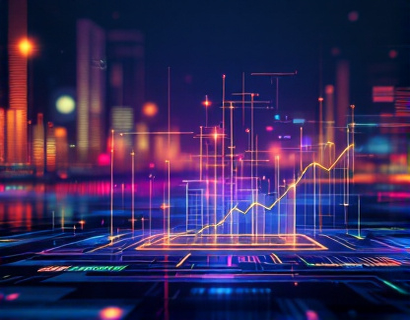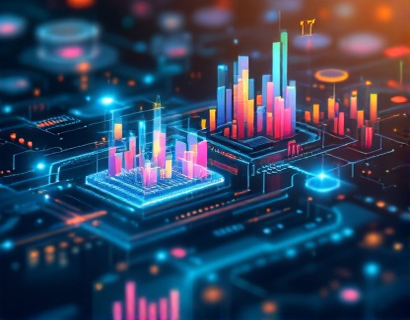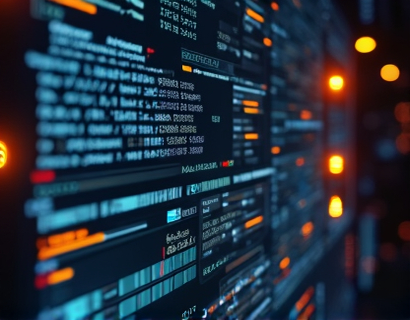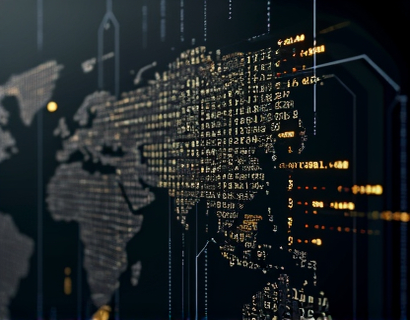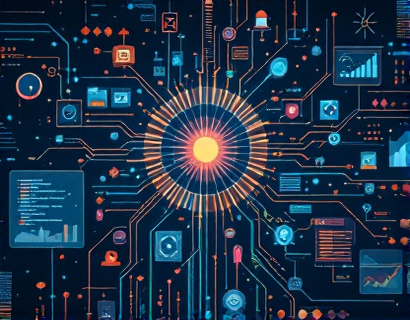Revolutionizing Digital Finance: The Synergy of AI and Crypto
The intersection of artificial intelligence and cryptocurrency is redefining the landscape of digital finance. This convergence is not just a technological advancement but a paradigm shift that promises to transform how we interact with financial systems. As we delve into this topic, it's essential to understand the foundational technologies driving this revolution and their implications for the future of finance.
Understanding AI and Cryptocurrency
Artificial intelligence, or AI, refers to the simulation of human intelligence processes by machines, particularly computer systems. These processes include learning, reasoning, and self-correction. In the context of finance, AI is used to analyze vast amounts of data, identify patterns, and make predictions or decisions with minimal human intervention.
Cryptocurrency, on the other hand, is a digital or virtual currency that uses cryptography for security. It operates on a decentralized network, typically a blockchain, which ensures transparency and immutability. Bitcoin, launched in 2009, was the first and most well-known cryptocurrency, but thousands of others have since emerged, each with unique features and use cases.
The Emergence of AI in Cryptocurrency
The integration of AI into cryptocurrency has been gradual but impactful. Initially, AI was used for basic tasks such as data analysis and market trend prediction. However, as AI technologies advanced, so did their applications in the crypto space. Today, AI is employed in various aspects of cryptocurrency, from trading and security to user experience and network management.
AI in Cryptocurrency Trading
One of the most visible applications of AI in cryptocurrency is in trading. AI algorithms can process and analyze vast amounts of market data in real-time, identifying patterns and making trades at optimal times. These algorithms, often referred to as algorithmic traders or bots, can operate 24/7 without fatigue, providing a significant advantage in the fast-paced crypto markets.
Machine learning, a subset of AI, is particularly useful in this context. Machine learning models can learn from historical data to predict future price movements. Techniques such as regression analysis, neural networks, and reinforcement learning are employed to build models that can adapt and improve over time. This capability allows traders to make more informed decisions and potentially increase their returns.
AI in Cryptocurrency Security
Security is a paramount concern in the cryptocurrency world, given the high value and decentralized nature of these assets. AI plays a crucial role in enhancing security measures. For instance, AI-powered systems can detect and prevent fraudulent activities by analyzing transaction patterns and identifying anomalies in real-time.
Blockchain itself is a secure technology, but the ecosystems surrounding it can be vulnerable to attacks. AI can help fortify these systems by continuously monitoring for suspicious activities and implementing countermeasures. Additionally, AI can be used to strengthen password systems and biometric authentication, ensuring that only authorized users access crypto assets.
AI in User Experience and Interface
The complexity of cryptocurrency platforms can be daunting for new users. AI is being leveraged to create more intuitive and user-friendly interfaces. Chatbots powered by natural language processing (NLP) can assist users with queries, providing instant and accurate information. These chatbots can handle a wide range of tasks, from explaining complex concepts to guiding users through transactions.
Furthermore, AI can personalize the user experience by recommending relevant services and products based on user behavior and preferences. This level of personalization not only enhances user satisfaction but also increases engagement and retention.
AI-Driven Financial Services
The impact of AI extends beyond trading and security to the broader realm of financial services. AI can revolutionize how financial institutions operate, offering more efficient, transparent, and accessible services.
Smart Contracts and DeFi
Decentralized Finance (DeFi) is an emerging sector that leverages blockchain technology to create financial services without traditional intermediaries. AI enhances DeFi by optimizing smart contracts, which are self-executing contracts with the terms directly written into code. AI can analyze and refine smart contract code to ensure they function correctly and securely, reducing the risk of bugs and vulnerabilities.
AI can also improve the liquidity and efficiency of DeFi platforms. By predicting market conditions and user behavior, AI can help optimize lending, borrowing, and yield farming strategies. This optimization ensures that users can access the best possible terms and conditions, enhancing the overall DeFi experience.
Robo-Advisors and Personalized Finance
Robo-advisors, AI-driven financial advisors, are becoming increasingly popular in the traditional finance sector and are finding a natural home in the crypto space. These digital advisors use AI to analyze users' financial goals, risk tolerance, and market data to create and manage customized investment portfolios.
In the context of cryptocurrency, robo-advisors can help users navigate the complex landscape of digital assets. They can recommend diversified portfolios, monitor performance, and adjust strategies based on market conditions. This level of personalized service is particularly valuable for individuals who may lack the expertise to manage their crypto investments effectively.
Challenges and Considerations
While the integration of AI and cryptocurrency offers numerous benefits, it also presents challenges that need to be addressed. One of the primary concerns is the regulatory environment. The decentralized and borderless nature of cryptocurrency complicates regulatory efforts, and the use of AI adds another layer of complexity. Regulators must balance innovation with consumer protection, ensuring that AI-driven financial services are transparent, fair, and secure.
Another challenge is the ethical use of AI. As AI systems become more autonomous, questions arise about accountability and bias. It's crucial to develop AI systems that are transparent and explainable, allowing users to understand how decisions are made. Additionally, efforts must be made to mitigate bias in AI algorithms to prevent unfair treatment of certain groups.
Data Privacy and Management
Data privacy is a significant concern in the crypto space, and AI exacerbates this issue due to its data-intensive nature. Ensuring that user data is handled securely and in compliance with privacy regulations is paramount. Implementing robust data governance frameworks and employing advanced encryption techniques can help protect user information.
Moreover, the management of large datasets required for AI training and operation must be handled efficiently. This involves not only storing and processing data but also ensuring its integrity and availability. Cloud-based solutions and edge computing can play a role in managing these challenges, providing scalable and secure data management options.
The Future of AI and Crypto
Looking ahead, the synergy between AI and cryptocurrency is poised to drive further innovation and transformation in the financial sector. As AI technologies continue to advance, we can expect even more sophisticated applications in the crypto space.
Predictive Analytics and Market Optimization
Predictive analytics powered by AI will become more accurate and comprehensive, enabling better market optimization. AI can integrate multiple data sources, including social media sentiment, economic indicators, and historical data, to provide a holistic view of market dynamics. This holistic approach can lead to more precise predictions and strategic decision-making.
Cross-Chain Interoperability
Interoperability between different blockchain networks is a critical area where AI can make a significant impact. AI can facilitate the development of protocols that enable seamless communication and asset transfer across different blockchains. This interoperability is essential for building a more connected and efficient decentralized ecosystem.
Enhanced User Interfaces and Experiences
The future of crypto interfaces will be deeply influenced by AI, leading to more intuitive and user-centric designs. AI-driven interfaces will adapt to user preferences and behaviors, providing a seamless and personalized experience. Virtual and augmented reality technologies, combined with AI, can create immersive financial experiences, making crypto more accessible and engaging for a broader audience.
Conclusion
The convergence of AI and cryptocurrency is not just a technological trend but a fundamental shift in how we approach digital finance. This synergy is reshaping financial services, creating new opportunities, and addressing longstanding challenges. As the technologies continue to evolve, the potential for innovation and growth in the crypto space remains vast. For tech enthusiasts and innovators, this is an exciting time to explore and contribute to this transformative journey.








